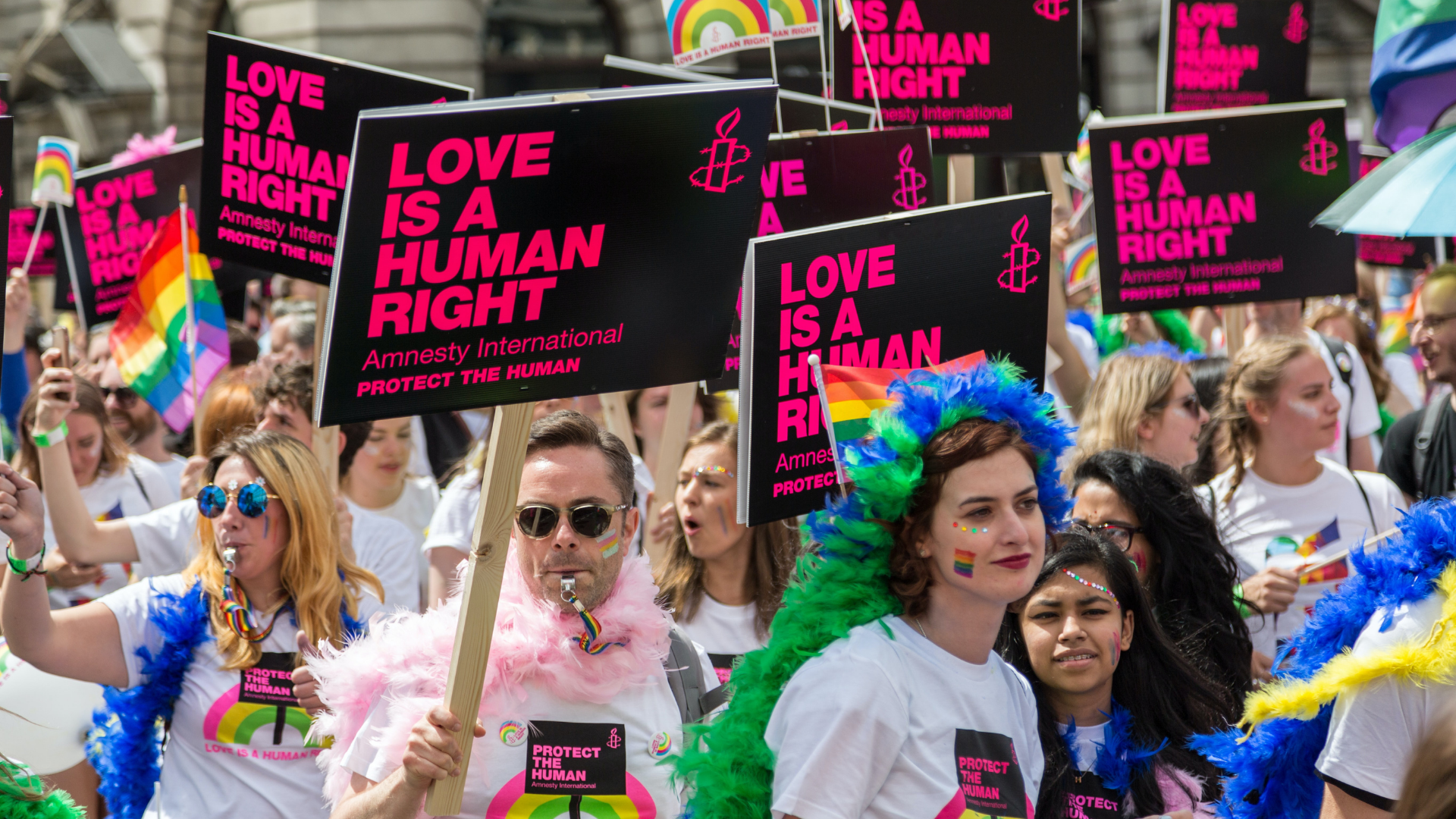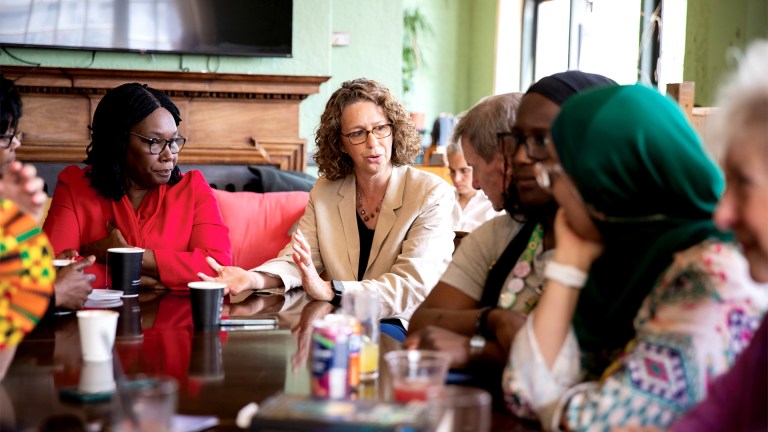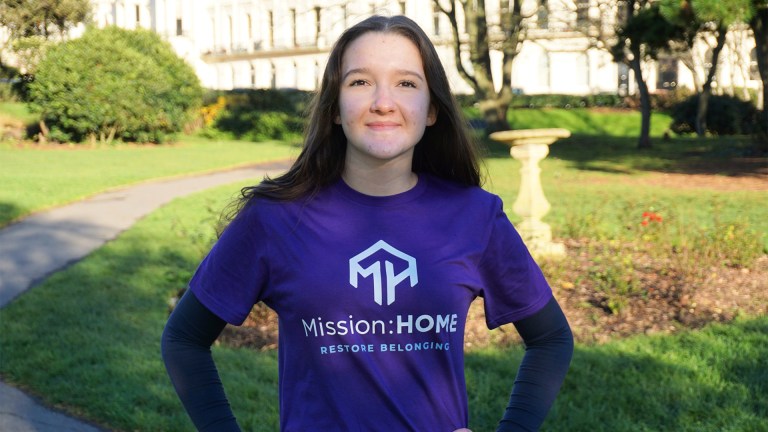Asylum seekers said interpreters refused to translate words such as ‘gay’ and ‘bisexual’, did not understand basic concepts of sexual diversity, and perpetuated homophobic or transphobic abuse. But since only the asylum seeker and translator understand what is being said and read, no one else knows what is happening.
According to the report, a welcome guide provided by Migrant Help and translated into Arabic contained an offensive homophobic term for lesbian in text providing signposting to LGBTQ+ support organisations.
Unsafe Home Office accommodation for LGBTQ+ migrants
After entering the asylum system in the UK, housing is provided on a no-choice basis, usually in accommodation with multiple occupants, often constituting the populations queer people have escaped from. This was one of the biggest risks faced by LGBTQ+ migrants in the report.
“Doors in some houses do not have locks, making it impossible to shelter safely from assailants,” said McKnight.
“One gay asylum seeker reported having to sleep with a knife under his pillow for protection. One trans woman was sexually harassed in lifts by asylum seekers and followed to her bedroom by groups of men. A service provider in Wales reported that a trans asylum seeker was forced to hide in his room after being threatened with a knife by another resident. Unable to call the police, as there was no signal, he went downstairs and was accosted again and had his phone smashed.
“The housing provider classed this as a ‘household spat’ and took no action to safeguard the victim. The report also details that a ‘femme’ presenting gay man had to sleep with a chair against his door due to unwanted advances from other residents.”
Advertising helps fund Big Issue’s mission to end poverty
Respondents said they were scared to report abuse in accommodation for fear of making the situation worse, or from fear of the police based on previous experiences, often saying nothing was done about their reports of abuse.
‘I was scared to come out of my room‘
When Victor Iringere claimed asylum in 2017 to escape the homophobic abuse of his family, coworkers, and police in Nigeria, he was moved into a house shared by four other men.
“I was the only gay person in the house and the only one who didn’t speak Arabic, which added the difficulty of a language barrier,” the 30-year-old told the Big Issue. “One of these men started to sexually harass me. He seemed to think that because I was gay it was fine for him to grab me when I was cooking or in a shared living space. It escalated to him dry humping me and got so bad that I was scared to come out of my room.”
When Iringere reported the housemate to his housing officer, the behaviour didn’t stop, and he didn’t get an update on any action taken to protect him.
Although Iringere said the UK is safer for LGBTQ+ people than Nigeria, he often felt “unwelcome, unfairly treated, and discriminated against” during the asylum process.
Now helping to run a support group for other LGBTQ+ asylum seekers in Coventry, Iringere isn’t surprised by the findings in the SEREDA report, saying he hears stories “all the time” of “people suffering homophobic abuse from interpreters during Home Office interviews and living in unsafe accommodation”.
Advertising helps fund Big Issue’s mission to end poverty
“The Home Office needs to implement better safeguarding for queer asylum seekers, including expanding specific LGBTQ+ accommodation, to keep people safe while their claim is being processed,” he said.
Viable solutions to protect LGBTQ+ asylum seekers
The report also highlighted the pressure queer people seeking asylum face to both be visible and invisible. While they need to provide an incredibly high burden of proof for their claim as required by the recent Nationality and Borders Act, they must also hide their identity and sexuality to avoid abuse and harassment. They need to be visibly queer for the Home Office, fitting Eurocentric stereotypes of what it means to be queer, but invisible to their fellow asylum seekers.
Although it is unclear how many LGBTQ+ asylum seekers are impacted by similar experiences, as the Home Office doesn’t keep these statistics, many of those interviewed for the report said they too, like Iringere, lived in fear while seeking asylum in the UK.
“They feel unsafe in asylum accommodation, fear being exposed or abused, and dread being sent to countries where they could face violence and discrimination,” Minesh Parekh, policy and public affairs manager at the charity Rainbow Migration, told Big Issue. “People who are looking to rebuild their lives in safety should be met with compassion, not government policies that expose them to harm.”
McKnight said LGBTQ+ asylum seekers are “broken” by the Home Office’s treatment.
“The levels of poor mental health among this population are disproportionately high, compounded by a lack of specialist services to support them in recovering from their trauma,” she said. “The system was repeatedly described by participants as dehumanising. Many arrive in the UK with good skills, good English, and so much to contribute, but by the time they have been through the system they must then recover from the trauma of that before they can even think about building a new life.”
Advertising helps fund Big Issue’s mission to end poverty
The report outlines 19 recommendations to better protect queer asylum seekers in the UK system. Included are suggestions to improve safe housing and lower the standard of proof required in asylum claims.
Parekh said he’d first like to return to the standard of proof required in asylum claims pre-Nationality and Borders Act so that “claims are considered fairly”.
“With the current standard, it’s even harder to prove your sexual orientation or gender identity,” he said.
He wants to see people placed in safe accommodation by scrapping the policy of forced bedroom sharing and instead giving people a choice location and type of accommodation based on their needs.
In addition, McKnight urged the establishment of a specially trained team, including interpreters, to assess LGBTQ+ asylum claims in a way that is trauma-informed and responsive to the lived experiences of people outside the western LGBTQ+ paradigm, and for accessible, safe routes for queer people to get into the UK.
Unfortunately, she said “none of the major parties talk about any specific provision for LGBTQ+ asylum seekers” and that the political climate around migration and refugees is particularly unhelpful when it comes to discussing this issue.
Advertising helps fund Big Issue’s mission to end poverty
Despite a lack of promises from both Labour and Conservatives, Iringere is hopeful for change to protect peers in his community.
“With support from members of the public, I hope that the next government will listen to our experiences,” Iringere concluded. “That they would make humane decisions in their handling of LGBTQIA+ and all other asylum seekers and refugees.”
Big Issue has contacted the Home Office for comment.
Do you have a story to tell or opinions to share about this? Get in touch and tell us more. Big Issue exists to give homeless and marginalised people the opportunity to earn an income. To support our work buy a copy of the magazine or get the app from the App Store or Google Play.









